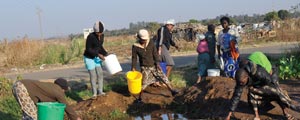
For the past few years Lynette Maswera (38) has had to rely on her neighbours — who have a borehole in their yard — for water.
Report by Phillip Chidavaenzi
She lives in the plush, upmarket Harare suburb of Eastlea, one of the capital’s neighbourhoods, which has not been spared the water crisis that has become the bane of the city.
“I don’t expect anything better,” she says. “This is the life we now know and understand. The city council has been a big letdown.”
Her sentiments are shared by many of Harare’s residents who feel betrayed by the city authorities in whom they have put their faith.
“The council gives too many excuses,” says Maswera, who seems to have her wits about her. “If you read in the papers you hear them giving one excuse after another. No one talks about the solutions.”
Water is political, she told NewsDay, and what this means is the authorities voted into office at Town House have failed in their mandate and need to be shown the door in the forthcoming elections.
A residents’ representative body, the Harare Residents Trust (HRT), argued council has its priorities mixed up, creaming off the municipality while the city decayed under their watch.
- Chamisa under fire over US$120K donation
- Mavhunga puts DeMbare into Chibuku quarterfinals
- Pension funds bet on Cabora Bassa oilfields
- Councils defy govt fire tender directive
Keep Reading
Precious Shumba, the trust’s director, said council officials need to roll up their sleeves and get to work.
“They (city council) should stop the purchase of (luxury) vehicles for senior management and concentrate on the provision of clean water, improvement of their billing system, and develop a stakeholder plan on the phased replacement of old underground distribution pipes,” he said.
“They should stop the diversion of water revenue to cover salaries and other administration cost. Harare’s water crisis needs to be declared a national emergency because the council will not be able to address it in the short to medium term.”
Tendai Mahachi, the town clerk, recently told a parliamentary committee on local government their major cause for headaches has been the water infrastructure which, apart from old age, has not been able to bear the burden of an increased population in the city and its dormitory towns.
The problem, he added, had been exacerbated by an astronomical debt.
“The city doesn’t have enough water because it has been expanding and we have not been able to increase the infrastructure,” he told the lawmakers. “Most of the people we’ve been supplying with water, including our sister local authorities and our own government owe us significant amounts of money.”
Local government secretary Killian Mupingo said the city has secured $2,312 million grant from ZimFund, through the African Development Bank (ADB), which will be pumped into Morton Jaffray waterworks, which has outlived its lifespan, for the installation and commissioning of six pumps and replacement of the problematic pipe at Morton Jaffray.
Mahachi said the city’s water infrastructure has suffered extensive wear and tear which has seen increased leakages of clean water.
“We are losing more than 60% of treated water and this is not acceptable. If we harness that, we will serve 80% of Harare with water,” he said.
Mahachi said they have secured $9, 5 million grant from the ADB which will be used for, among other things, replacement of some pipes at Morton Jaffray and Prince Edward Waterworks as well as the purchase of replacement equipment in China.
“The remainder will go to sewerage treatment works. We want to reduce our chemical consumption,” he said. “The loan will further enhance water availability by a comprehensive rehabilitation of the City’s water treatment works, thereby addressing water supply to areas currently not receiving adequate (water) supply.”
All these, however, are piecemeal solutions, and this reality is not lost on the city fathers.
Mahachi told the committee a lasting solution to the water crisis in Harare would only be found once the Kunzvi and Musami dam projects were finalised.
“The Kunzwi and Musami dam projects are on the table, but these are long term. There is something happening at the moment because these are part of the total solution,” Mahachi said.
According to the Zimbabwe National Statistical Agency (ZimStat), the results for the August 2012 population census revealed that Harare accounts for 16% of the country’s total population, which translates to 2 098 199 people in the city.
“Since the commissioning of Morton Jaffray Waterworks in 1953, the plant has not been expanded to correspond with the increasing population. The colonial government used to service water infrastructure every five years, but since independence there has not been any upgrade. Prince Edward has not been upgraded since 1973 and that is why there is a shortfall,” Harare mayor Muchadei Masunda said.
“The way forward is to bring Kunzwi Dam on stream because right now the installed capacity of Morton Jaffray Waterworks that draws water from Lake Chivero and Manyame River — which serves Greater Harare, Norton, Ruwa, Epworth and Chitungwiza — is 604 megalitres per day for a hub of four million people.”
For the likes of Maswera, however, the wish is for the highbrow talk to end and action to begin, so they can have access to adequate, potable water.











